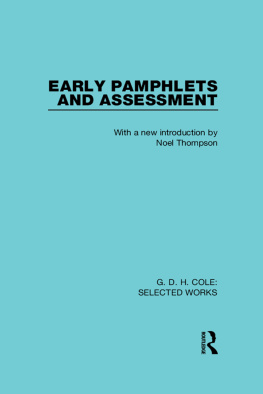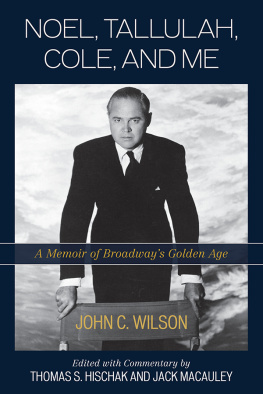Pamphlets first published between 1921 and 1956
This edition first published in 2011
by Routledge
2 Park Square, Milton Park, Abingdon, Oxon, OX14 4RN
Simultaneously published in the USA and Canada
by Routledge
270 Madison Avenue, New York, NY 10016
Routledge is an imprint of the Taylor & Francis Group, an informa business
Pamphlets 1921, 1932, 1943, 1944, 1948, 1951, 1952, 1954, 1956 H A Cole
New introduction 2011 Noel Thompson
Printed and bound in Great Britain
All rights reserved. No part of this book may be reprinted or reproduced or utilised in any form or by any electronic, mechanical, or other means, now known or hereafter invented, including photocopying and recording, or in any information storage or retrieval system, without permission in writing from the publishers.
British Library Cataloguing in Publication Data
A catalogue record for this book is available from the British Library
ISBN 13: 978-0-415-56651-3 (Set)
elSBN 13: 978-0-203-83931-7 (Set)
ISBN 13: 978-0-415-59726-5 (Volume 1)
elSBN 13: 978-0-203-83961-4 (Volume 1)
Publisher's Note
The publisher has gone to great lengths to ensure the quality of this reprint but points out that some imperfections in the original copies may be apparent.
Disclaimer
The publisher has made every effort to trace copyright holders and would welcome correspondence from those they have been unable to trace.
An Introduction to the Selected Works of G.D.H. Cole
Guild socialism
George Douglas Howard Cole was born in Cambridge on 25 September 1889, the son of a jeweller, who subsequently moved to Ealing and became a surveyor. In his own words he became a socialist as a schoolboy a year before the general election of 1906converted quite simply by reading William Morris's News from Nowhere which made me feel suddenly and irrevocably, that there was nothing except a socialist that it was possible for me to beI became a socialist as many others did in those days on grounds of morals, decency and aesthetic sensibility.
In 1908 he went to Balliol College Oxford to read classical history and philosophy, before being elected to a fellowship at Magdalen College in 1912 and focusing on the study of economic and political thought. During his time as an undergraduate he became involved in political activities through his membership of the Fabian Society and the I.L.P., agitating for the Workers Educational Association, to which he was to make a lifelong contribution, and editing the Oxford Reformer.
The period between Cole's embrace of socialism and the publication of his first major work, The World of Labour, 1913, was one of declining real wages, an aggregation of capitalist power by way of a concentration of industrial ownership, growing threats to the status of skilled sections of workforces, in consequence of skill-destroying technical change, a growth of industrial unrest and a rise in trade union membership which tripled between 1888 and 1910. Moreover this period saw both the emergence of new national unions and the growth of inter-union co-operation culminating in the Triple Alliance of the railway workers, miners and transport workers in 1914.
In such circumstances it is unsurprising that there emerged, both in Britain and elsewhere, socialist political economies that looked to a decentralised socialism brought into being by the efforts of the workers themselves rather than by the prior conquest of state power. All the more so, as the political route was one that seemed to have signally failed to advance the cause of the working class, despite the emergence of the Labour Party and its electoral success in securing 29 M.P.s in the 1906 election.
Syndicalism was one manifestation of this antipathy to the political road to socialism, with its emphasis on industrial struggle as the essential means of vesting ownership and economic decision-making power in the hands of the producers. Its influence was most potent in continental Europe, particularly France and the United States,
More importantly, in terms of its impact, the decade prior to the outbreak of the Great War also saw the emergence of guild socialism. A.J. Penty's Restoration of the Gild System, 1906, had articulated many of the elements of this. There was the setting of the producer centre stage, with the concomitant rejection of the notion that government should be conducted solely in the interests of man in his capacity as consumer. There was a focus on creative and fulfilling labour as the essential objective of any transformation of society. There was the rejection of the use of state power as a means of achieving this, and an emphasis rather on producer guilds as the motive force of social transformation; these guilds, like their medieval counterparts, were to regulate their trade, assume responsibility for the quality of what was produced, the price at which it was sold and the remuneration and social status of its members. Penty's work was, though, tinged with an atavistic medievalism and imbued with an antipathy to commercialism, international trade and mechanised mass production, that often spilled over into a more general antipathy to industrialism and all its works.
It was, therefore, S.G Hobson's National Guilds, an Inquiry into the Wage System and the Way Out, 1914, based on a series of articles in A.R. Orage's, The New Age, 1912, that precipitated the emergence of a guild socialism applicable to an industrial civilization: a guild socialism that in condemning the commoditisation of labour inherent in the wage system, also rejected that collectivism which threatened to replicate it in an economy characterised by extensive public ownership. Thus what Fabian socialists proposed would merely replace private capitalism with state capitalism, with the decision-making and controlling authority retained by the manager or bureaucrat. Fabian collectivism failed to extend the application of democratic principles to industry, while the Fabian attitude to democracy was arrogant and supercilious and inimical to the concept of an active and informed citizenry which Hobson saw as integral to socialism.
Guild socialism alone could effect the destruction of the wage system and trade unions would be both the means of its destruction and the natural nuclei of future industrial organisation.
As noted Cole's socialism was inspired by Morris's News from Nowhere and at the core of guild socialism, whether that of Penty, Hobson or others, was an embrace of the Morrisian notion that work should be about the expression of humanity's creative capacities and, therefore, about the intelligent production of beautiful things. Only a democratisation of the industrial process of the kind proposed by guild socialism would make possible such creative self-realization.
For the young Cole, the focus was on the need to effect a transformation of industry and society that replaced useless toil with joyful labour. The crowning indictment of capitalism was that it destroyed] the freedom and individuality in the worker, that it reduce[d] man to a machine, and that it treate[d] human beings as a means to production instead of subordinating production to the well-being of the producer.
To reawaken creativity, spontaneity and individuality in the worker it was imperative that the individual worker [should] be regarded not simply as a handbut as a man amongst men, with rights and responsibilities, with a human soul and a desire for self-expression, self-government and personal freedom. And, for this to occur, it was imperative that the control of industry should be democratized; that the workers themselves should have an ever-increasing measure of power and responsibility in control, and that capitalist supremacy be overthrown only by a system of industrial democracy in which workers will control industry in conjunction with a democratized State.














